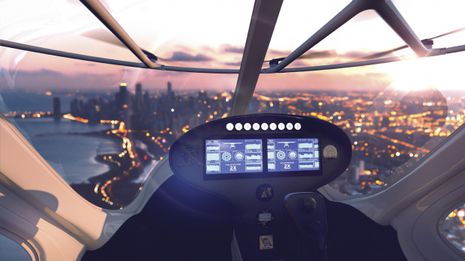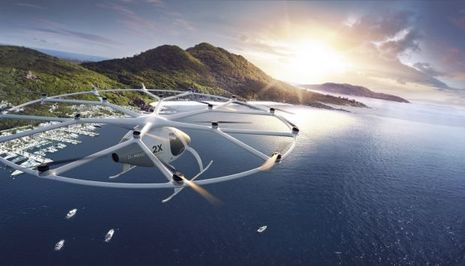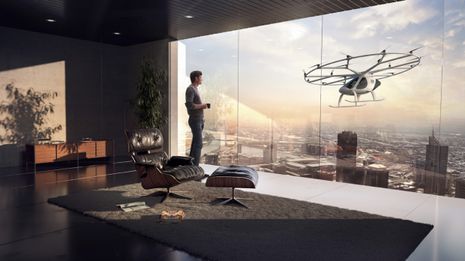At the end of the year, Dubai will transform science fiction into reality. The very first unmanned aerial cars will launch into the sky of the emirate. The revolution of the drones is taking off for good.
Paris Match. Why do you want to automate the transport of Dubai?
Ahmed Hashem Bahrozyan, Director General of the Dubai Road and Transportation Authority (RTA). Here, over 90% of road accidents are the result of human error. Moving in automated transport will reduce them considerably, and thus lower the mortality rate. In addition, it will help us to liberate urban spaces, reduce traffic congestion and greatly improve passenger comfort.
“Next step: establishing concrete rules for coordinating air traffic”
Are you environmentally conscious?
That is a very important point, indeed. We must think long-lasting to leave a planet clean to our children. That’s why we focus on deploying electric vehicles. With this plan in place by 2030, we intend to reduce our carbon footprint by 12% and to make users aware of clean energy.
What are the difficulties you are facing?
The RTA must establish concrete rules to coordinate conventional air traffic with that of its flying taxi service. We must also define the licensing conditions for stand-alone vehicles and consider the creation of an insurance structure. Finally, we want to set up an organization that will combat possible piracy and ensure efficient communication and interaction between all vehicles so that the traffic is as fluid as possible.
In Dubai, 25% of the means of transport will be autonomous in 2030

Three weeks ago, presentation to the Emir of Dubai, Sheikh Al-Maktoun (2nd from Dr), model number 1.
The small Gulf state is pursuing its goal of becoming the “smartest” in the world, especially in terms of urban mobility. He plans to deploy this service of autonomous flying taxis. It is the German company eVolo that will supply its taxis Volocopter 2X, a model halfway between the drone and the helicopter. The first tests in real conditions are planned “in the course of the fourth quarter 2017”, assures the Authority of the roads and transports of Dubai. However, eVolo says that its craft has already carried out a hundred empty flights and some with a person on board. And eventually, some of its buses, cars, subways and trains should be without driver.
How does the Volocopter 2X work?

Capable of transporting two people from point A to point B for 30 minutes, the Volocopter 2X is designed to fly at an average speed of 50 km / h but can reach 100 km / h thanks to its 18 rotors powered by 9 batteries lithium-ion battery. To control it, you do not need a patent. The machine is fully autonomous thanks to its sensors and screens, although it has a joystick and some manual controls.

In three months, we will travel with a flying taxi, the Volocopter
At the end of the year, Dubai will transform science fiction into reality. The very first unmanned aerial cars will launch into the sky of the emirate. The revolution of the drones is taking off for good.
Ahmed Hashem Bahrozyan, Director General of the Dubai Road and Transportation Authority (RTA). Here, over 90% of road accidents are the result of human error. Moving in automated transport will reduce them considerably, and thus lower the mortality rate. In addition, it will help us to liberate urban spaces, reduce traffic congestion and greatly improve passenger comfort.
“Next step: establishing concrete rules for coordinating air traffic”
Are you environmentally conscious?
That is a very important point, indeed. We must think long-lasting to leave a planet clean to our children. That’s why we focus on deploying electric vehicles. With this plan in place by 2030, we intend to reduce our carbon footprint by 12% and to make users aware of clean energy.

What are the difficulties you are facing?
The RTA must establish concrete rules to coordinate conventional air traffic with that of its flying taxi service. We must also define the licensing conditions for stand-alone vehicles and consider the creation of an insurance structure. Finally, we want to set up an organization that will combat possible piracy and ensure efficient communication and interaction between all vehicles so that the traffic is as fluid as possible.
In Dubai, 25% of the means of transport will be autonomous in 2030

Three weeks ago, presentation to the Emir of Dubai, Sheikh Al-Maktoun (2nd from Dr), model number 1.
The small Gulf state is pursuing its goal of becoming the “smartest” in the world, especially in terms of urban mobility. He plans to deploy this service of autonomous flying taxis. It is the German company eVolo that will supply its taxis Volocopter 2X, a model halfway between the drone and the helicopter. The first tests in real conditions are planned “in the course of the fourth quarter 2017”, assures the Authority of the roads and transports of Dubai. However, eVolo says that its craft has already carried out a hundred empty flights and some with a person on board. And eventually, some of its buses, cars, subways and trains should be without driver.
How does the Volocopter 2X work?

Capable of transporting two people from point A to point B for 30 minutes, the Volocopter 2X is designed to fly at an average speed of 50 km / h but can reach 100 km / h thanks to its 18 rotors powered by 9 batteries lithium-ion battery. To control it, you do not need a patent. The machine is fully autonomous thanks to its sensors and screens, although it has a joystick and some manual controls.

If one believes its designers, the “cuckoo” could be available for sale in the course of 2018 for the sum of 250,000 euros. For the time being, only the authorities of Dubai have given their consent for the device to fly over inhabited areas.
3 concepts of autonomous flying car
From g. to dr. :
Liberty of PAL-V (United States)
299,000 euros (basic version), 499,000 euros (premium version).
Date of release: 2018.
Maximum speed: 160 km / h (on the road); 180 km / h (in flight).
Autonomy:
7.6 l / 100 km (on road); 500 km (in flight).
Altitude max. :
3,500 meters.
Ehang 184 (China)
Between $ 200,000 and $ 300,000.
Speed: 100 km / h.
Autonomy: 23 minutes
(electric battery).
Altitude max. : 300 meters.
AeroMobil (Slovakia)
€ 1.2 million. Date of release: 2020.
Maximum speed: 160 km / h (on the road); 360 km / h (in flight).
Autonomy: 4.2 l / 100 km (on the road); 750 km (in flight).
Altitude max. : 595 meters.


